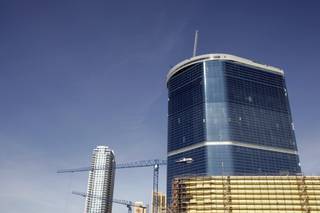
The case involves the still-unfinished Fontainebleau, which was bought by Carl Icahn for pennies on the dollars owed to lenders and contractors.
Tuesday, July 20, 2010 | 2 a.m.
Who's affected
The case involves only lenders who have paid off earlier loans, to buy land, for example. It pits their claims against those of contractors with mechanics’ liens on the property if they began work before the second lender paid off the initial loan. The decision could affect scores of projects in Southern Nevada.
Sun Archives
- $1.2 billion in Fontainebleau construction permits pulled (6-22-2010)
- Fontainebleau sitting idle benefits Strip’s economy (2-20-2010)
- Carl Icahn gets OK for Fontainebleau at bankruptcy hearing (1-27-2010)
- Carl Icahn to take ownership of Fontainebleau Las Vegas resort (1-19-2010)
- Will a big wager on Fontainebleau pay off? (1-16-2010)
- Deadline for Fontainebleau bids set for Friday (1-11-2010)
- Fontainebleau judge details guidelines for credit bid (12-8-2009)
- Fontainebleau: Half-built bargain bid up by billionaire (12-7-2009)
- Fontainebleau lenders sue construction companies over liens (11-27-2009)
One bitter result of Southern Nevada’s economic downturn is an emerging court battle pitting builders and their suppliers against banks.
The dispute, now before the Nevada Supreme Court, involves who gets to be first in line to collect any money earned from the sale or foreclosure of a failed development that owes money to both contractors and lenders.
It involves cases such as when money was borrowed from one lender to acquire land and then a second lender stepped in to pay off the initial loan.
A federal judge presiding in a bankruptcy case in Miami involving the Fontainebleau Las Vegas on the Strip wants the state court to determine whether Nevada law gives those second lenders the right to trump mechanics’ liens filed against developments by unpaid contractors. Because the state court has never ruled on this issue, its decision will set a precedent that could have a significant effect on scores of Southern Nevada developments that have gone into default.
Mechanics’ liens in Clark County spiked in 2008 when 3,644 were filed, more than double the prior year’s filings. The number of liens then dropped to 2,118 last year and 1,075 for the first six months of this year.
Contractors say a ruling against them could devastate their industry. They argue that under Nevada law they have first priority to recoup money from mechanics’ liens placed on the defaulted property if they began construction before the second lender paid off the initial loan. Such liens are designed to preserve the rights of contractors and suppliers to seek foreclosure against the project owner as leverage to get paid.
“If the court rules against us, it could affect 100 percent of our members,” said Steve Holloway, executive vice president of the Associated General Contractors’ Las Vegas chapter. “It could in many ways make the mechanics’ lien laws meaningless.”
The problem for contractors is that they spend money to do their work before they get paid. A defaulted project naturally cuts into their profits.
“If a contractor goes out and does work, he needs to be protected and his only protection is the lien rights,” said Steve Brooke, executive vice president of North Las Vegas contractor Jaynes Corp.
The second lenders, though, say they should have first priority under a legal doctrine called equitable subrogation because they are simply stepping into the shoes of the initial lenders, who would have had first crack at any money recouped from a development that went belly up. The lenders, too, argue that their profits are hurt when loans aren’t repaid.
The Nevada Bankers Association is expected to file a brief in support of the equitable subrogation argument. Association CEO William Uffelman declined to comment, deferring to association attorney John Sande III of Reno. But Sande didn’t return repeated phone calls for comment.
The Associated General Contractors, through Las Vegas attorney Leon Mead II, is preparing a brief on behalf of contractors. Mead said the state court has rejected equitable doctrines in the past when the Legislature has enacted a statute on a specific issue. That’s why he hopes the court will conclude that under Chapter 108 of the Nevada Revised Statutes, mechanics’ liens should be honored once construction begins.
He also said it would be unjust if second lenders received money from the sale of distressed properties while contractors who had performed work were left without payment. Those lenders, he said, should take note that “a deterrence to a mechanics’ lien would be to pay contractors for their work.”
The high court is weighing in on this debate at a precarious time for the construction industry.
Data released Monday by the Nevada Department of Employment, Training and Rehabilitation showed a 26 percent drop in construction jobs in the Las Vegas area, from 63,300 in June 2009 to 46,800 last month.
The state’s chief economist, Bill Anderson, said the downward trend in construction jobs reflects both the slowdown in new housing and a tight credit market for commercial developers.
“We rode the construction bubble up in the mid-2000s, and now we’re riding it down,” Anderson said.
The state court is being asked to weigh in on a case involving financier Carl Icahn’s acquisition of the unfinished Fontainebleau for roughly $150 million in February, resulting in pennies on the dollar for contractors and lenders to fight over.
A financial plaintiff in the Fontainebleau case, Wilmington Trust FSB, which replaced Bank of America as the lenders’ representative for that development, filed a complaint last year that prompted bankruptcy Judge A. Jay Cristol on June 29 to seek a ruling from the Nevada court.
Wilmington, opposing dozens of contractors that have filed mechanics’ liens, argued that those companies had agreed to “subordinate their interests” to those of any lender on the project. Wilmington also argued that some of those liens were unlawful because they were filed by contractors who were not licensed when they bid on the project or did not have a license during construction.


Join the Discussion:
Check this out for a full explanation of our conversion to the LiveFyre commenting system and instructions on how to sign up for an account.
Full comments policy